Surgical Tooth Extractions – Coppell, TX
We Remove Problematic Teeth
Ideally, you would be able to keep all of your teeth throughout your lifetime. Sadly, though, some circumstances can arise that may make it necessary for you to undergo one or more tooth extractions. Simple tooth removal can be performed by general dentists, but what if there are some complicating factors in your case? You may need to visit us for surgical tooth extractions . Read on below to learn more about how our skilled team removes problematic teeth with the goal of helping our patients enjoy optimum oral health.
Why Choose Steel Oral Surgery for Surgical Tooth Extractions?
- Sedation Available for Patient Comfort
- Able to Handle Even Complex Cases
- Dental Insurance Benefits Maximized
Reasons Why Surgical Tooth Extractions Are Necessary
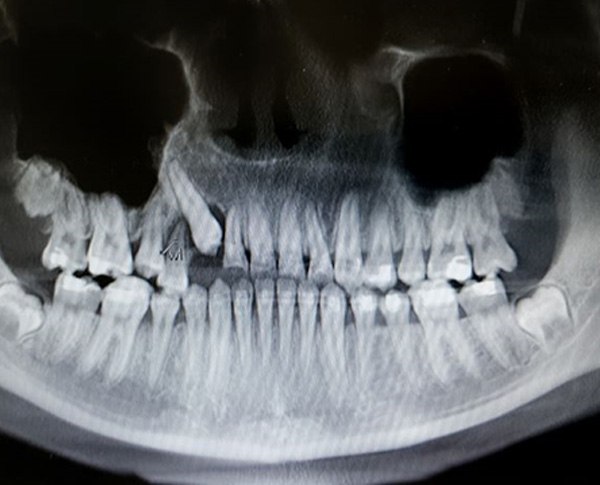
A surgical tooth extraction may be necessary if:
- An erupting tooth has become impacted (stuck either fully or partially beneath the gumline). This is often true of wisdom teeth.
- A tooth that is stuck within the jawbone has developed a serious infection.
- Trauma to the facial structures has damaged the jawbone and compromised its ability to support one or more teeth.
- A tooth is broken or cracked beneath the gumline.
- The bone or gum tissue supporting a tooth is dense enough that it would make a simple extraction impossible.
The Process of Surgically Removing a Tooth
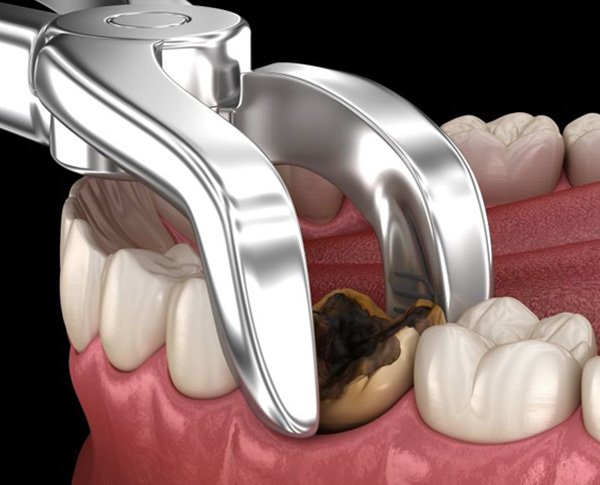
First, you should meet with Dr. Steele and our team so we can learn all the details of your situation. We will take some X-rays and might even use our CBCT machine to get a highly detailed look at your oral structures.
After planning the details of your procedure, we will get to work on your extraction. First, though, we will numb your mouth and possibly administer sedation. Once you are comfortable, we may need to make incisions in your gumline to access the troublesome tooth. We may also have to remove a bit of bone tissue and/or break the tooth into small pieces in order to get it out of your mouth.
Once we clean up the extraction site and close your incisions, you can go home to begin your recovery process.
Surgical Tooth Extraction Aftercare

Here are some tips to help you enjoy a smooth recovery after your surgical tooth extraction procedure:
- Avoid strenuous physical activity.
- Prop your head up on pillows while you are sleeping.
- Take any medications as prescribed by our team.
- Do not smoke.
- Do not use a drinking straw.
- Stick to a soft or no-chew diet.
- After the first 24 hours, regularly rinse your mouth with warm salt water.
You should also attend any follow-up appointments recommended by our team. Whether or not it is possible to replace the extracted tooth/teeth, we may need to administer post-op care just to make sure everything is healing correctly.
Understanding the Cost of Surgical Tooth Extractions
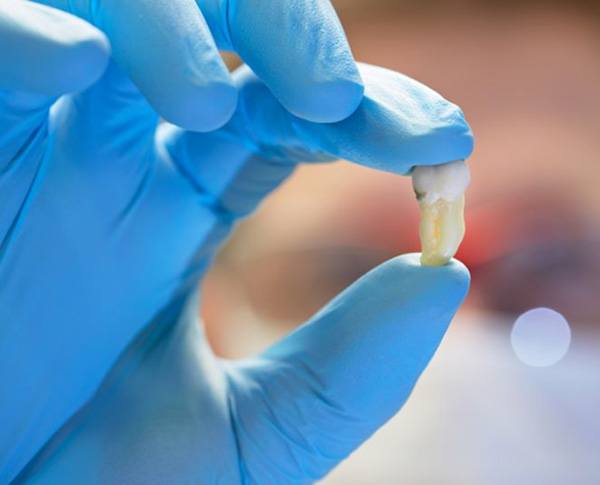
The cost of surgical tooth extractions can depend on several factors. When you visit our practice for a complimentary consultation, we will evaluate the specifics of your case before we provide a cost estimate. If you are concerned about being able to pay for your care, let us know. We will be able to help you file insurance claims, and we accept financing. Most patients find that, with the proper assistance, their procedure is surprisingly affordable.
Factors That Can Affect Surgical Tooth Extraction Cost
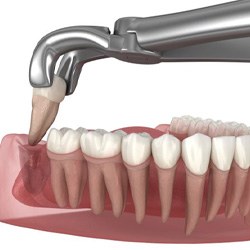
Some factors that might influence the cost of your surgical tooth extraction procedure include:
- The type of tooth that needs to be removed. The type and location of a tooth can affect how difficult it is to remove.
- The number of teeth that must be extracted. Logically, removing multiple teeth incurs higher fees than removing just one.
- The overall complexity of your case. We can handle even very complex cases in our office. However, the most challenging cases require more time and resources, so they tend to cost more.
- Additional care. Sedation during your extraction will add to your total bill. If you choose to get a dental implant to replace your lost teeth, you can expect to pay a separate fee for that.
We always strive to be upfront with our patients about the cost of care; we do not want you to run into any unpleasant surprises when you are paying for your treatment.
Does Dental Insurance Cover Surgical Tooth Extractions?

Many dental insurance policies do cover the cost of surgical tooth extractions. The procedure is usually classified as a major service, so around 50% of its cost might be covered, up to the amount of your policy’s annual maximum. Our practice welcomes insurance, and we are in-network with several major plans, including Aetna Dental PPO, BCBS Dental PPO, Humana Dental PPO, and many more. Simply give us your insurance information so we can verify your benefits and help you minimize your out-of-pocket expenses.
Other Options for Making Surgical Tooth Extractions Affordable

Aside from insurance, there are a couple of provisions that might make it easier for you to afford your surgical tooth extractions:
- A FREE consultation. This first step on your treatment journey is available at no charge. X-rays are included!
- We accept third-party financing from CareCredit, Lending Club, and Compassionate Finance. Applying for credit is fast and easy, and most patients are eligible for a payment plan that fits within their budget.
Our team is ready to assist you with your surgical tooth extraction needs. To learn more about us, our financial policies, and the price of our services, get in touch with us to book a consultation. We look forward to helping you enjoy a healthier smile!
Surgical Tooth Extractions FAQs
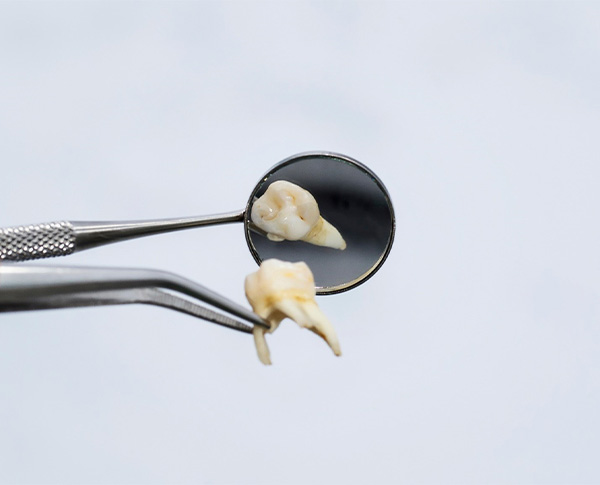
When you come to our office for a surgical tooth extraction, we will take the time to answer any questions you may have about the procedure. You can count on us to make sure that you’re informed about what you can expect during the process while also putting any concerns you might have to rest. To make things as convenient as possible for our patients, we have answered a number of common questions about surgical tooth extractions in the following FAQs.
Does Getting a Tooth Surgically Extracted Hurt?
This is one of the biggest worries on the minds of a lot of patients. However, before we begin the extraction process, we will apply a local anesthetic to the area, thus keeping your mouth numb during the procedure. (Depending on the situation and your preferences, sedation dentistry may also be used.) Our team will give you detailed aftercare instructions to help you manage any soreness that you might experience after your treatment. Contact us immediately if your post-operative pain gets worse or if it’s accompanied by warning signs of an infection.
How Should I Prepare for My Surgical Tooth Extraction?
Our team may give you some instructions to follow before your tooth extraction. For example, you may be told to avoid consuming anything besides water on the day of your appointment. Also, if we prescribe any medicine, you should go out of your way to pick it up before you arrive at our office. If your procedure will involve oral conscious sedation, IV sedation, or general anesthesia, you should have a trusted adult accompany you to your appointment so that they can drive you home afterward.
What Risks are Involved with Surgical Tooth Extraction?
You need to be careful to avoid a dry socket after your surgical tooth extraction. When a tooth is removed, a blood clot forms as part of the healing process; a dry socket can occur if the blood clot is dislodged. Not only can a dry socket cause a considerable amount of discomfort, but it can also slow down recovery.
Furthermore, if you don’t take the right steps to protect your smile, an infection might occur at the extraction site. If said infection isn’t treated promptly, it could eventually spread to other parts of your body.
The good news is that you can keep your risk for post-extraction complications to a minimum simply by carefully following our aftercare instructions.
Can I Leave the Space Empty After a Surgical Tooth Extraction?
After a tooth has been removed, you do have the option of simply leaving the space alone. However, you shouldn’t underestimate how important a complete smile is for your ability to chew your food, speak clearly, or smile with confidence. As such, most experts will recommend having the tooth replaced as soon as possible no matter where it was located; dental implants can often be an excellent choice for filling in the gap.
Dental Implants Cosmetic Treatment Sedation Dentistry View Our Services






